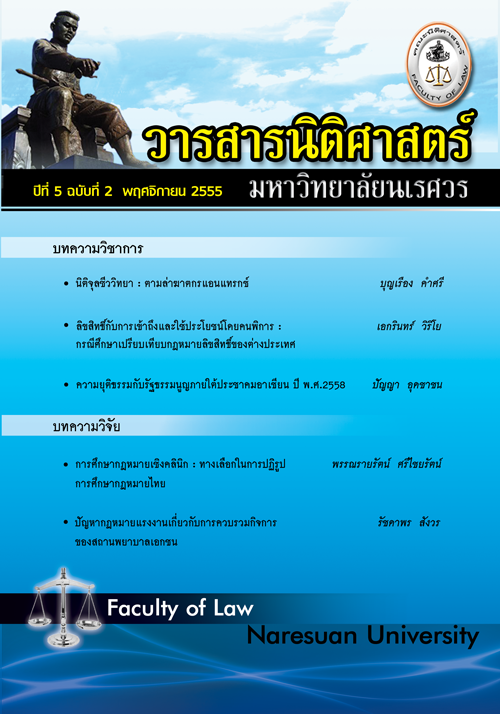Clinical Legal Education: An Option for the Thai Legal Education Reform
Main Article Content
Abstract
Clinical Legal Education (CLE) is a method of teaching and studying law. Some of the key objectives of CLE are to teach lawyering skills and to instill social-justice values of legal professionals into law students. The teaching methodologies utilized in the clinics are learning-by-doing and other interactive teaching methods. CLE methodologies also require students to implement legal theories and legal principles in real situations, to perform lawyer’s roles under faculty supervision, and to review and reflect their experiences. Many evaluation techniques are employed throughout the course.
This research found that CLE provides students opportunities to gain necessary basic lawyering skills; such as, client interviewing, client counseling, advocacy, legal research, negotiation, mediation, drafting, oral and written communication skills, legal analyzing and reasoning, critical thinking, problem solving, communicating with non-lawyers, and identifying and solving ethic dilemma.
The in-depth interview research found that CLE in China has been accomplished in enhancing students’ lawyering skills, knowledge of legal theories and provisions, awareness of legal effect on real people and of the potential and limitation of legal system in real world. The utmost finding of this research is that CLE in China has been accomplished in instilling lawyer values and ethics into their students. In addition, CLE assists students to comprehend the conditions of legal profession and creates students’ good attitude towards legal education and the profession.
Lastly, this research found that CLE is in accordance with the framework of the Thai education reform as appeared in the National Education Act, B.E. 2542. CLE has potential to make the Thai legal education reaches the goals of the national education reform to enhance students’ morality and ethics, as well as their knowledge and necessary professional skills. This research, thus, recommends that CLE should be integrated into the Thai law curriculum as a compulsory comprehensive course and CLE teaching methodologies should be utilized in every law course.
Article Details
References
สถาบันกฎหมายอาญา. การพัฒนาบุคลากรและเสริมสร้างองค์ความรู้: กุญแจการพัฒนากระบวนการยุติธรรมสู่ศตวรรษหน้า. รายงานการสัมมนาทางวิชาการ วันที่ 8 เมษายน 2542 ณ ห้องบรรยาย 2 สำนักอบรมศึกษากฎหมายแห่งเนติบัณฑิตยสภา (unpublished document). กรุงเทพฯ: สถาบัน, 2542.
American Bar Association. "Report of the Task Force on Law Schools and the Profession." Accessed March 26, 2009. https://www.abanet.org/legaled/publications/onlinepubs/maccrate.html.
Barry, Margaret Martin, Jon C. Dubin, and Peter A. Joy. “Clinical Education for This Millennium: The Third Wave.” Clinical Law Review. 7, (2000): 1-75.
Bloch, Frank S., ed. The Global Clinical Movement Educating Lawyer for Social Justice. New York: Oxford University Press, 2011.
Andreas Bücker and William A. Woodruff. “The Bologna Process and German Legal Education: Developing Professional Competence through Clinical Experiences,” German Law Journal. 9, (2008): 575-617.
Hovhannisian, Lusine. "Clinical Legal Education: A Practice-Oriented Methodology Developing in New Member States of the European Union." Accessed April 11, 2008. https://www.pili.org/en/dmdocuments/ELFAfinI.doc.
Hugg, Patrick R. “Comparative Models for Legal Education in the United States: Improved Admissions Standards and Professional Training Centers.” Valparaiso University Law Review. 30, (1995): 51-98.
Korioth, Stefan. “Legal Education in Germany Today.” Wisconsin International Law Journal. 24, (2006): 85-107.
Lewis, Richard. "Clinical Legal Education Revisited." Accessed October 17, 2009. https://www.law.cf.ac.uk/research/pubs/repository/212.pdf.
Maccrate, Robert. “Educating a Changing Profession: From Clinic to Continuum.” Tennessee Law Review. 64, (1997): 1099-1133.
Mcquoid-Mason, David. “The Mission of Clinical Legal Education (CLE) and Its Main Components-Academic and Legal Service-and the difference between CLE and Legal Aid and NGO Initiatives.” Paper presented at Southeast Asia Clinical Legal Education Conference, Phnom Penh, Cambodia, November 26-30, 2005.
Menon, N.R. Madhava, ed. Clinical Legal Education. Lucknow: Eastern Book, 1998.
Notes. “Adopting and Adapting.” Harvard Law Review. 120, (2007): 2134-2155.
Sonsteng, John. “A Legal Education Renaissance: A Practical Approach for the Twenty-First Century.” William Mitchell Law Review 34, (2007): 319.
Wilson, Richard J. “Training for Justice: The Global Reach of Clinical Legal Education.” Penn State International Law Review. 22, (2004): 421-431.
Wizner, Stephen. “What Does It Mean to Practice Law “In the Interests of Justice” in the Twenty-first Century?: The Law School Clinic: Legal Education in the Interests of Justice.” Fordham Law Review. 70, (2002): 1929-1937.
Yanmin Cai. “Global Clinical Legal Education and International Partnerships: A Chinese Legal Educator’s Perspective.” Maryland Journal of International Law 26, (2011): 159-172.
Zhen Zhen. "The Present Situation and Prosperous Future of China Clinical Legal Education." Accessed April 7, 2008. https://www.law.ucla.edu/docs/zhen__zhen_-.


